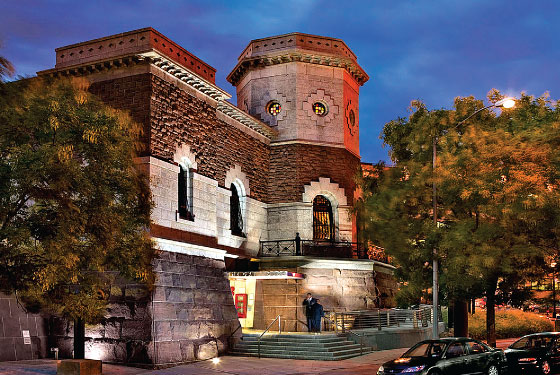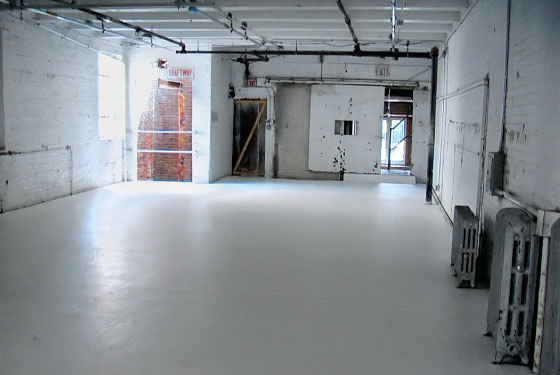
What differentiates independent productions from Big Broadway? The audience. These are plays for people who actually like to go to the theater. And it is, like all indie culture, where big ideas grow up. Harvey Fierstein has put it best: “Eighty percent of what is now considered the American theater originated at La MaMa.” Here, a guide to the La MaMas of today—which, it’s nice to note, still includes the original.
P.S. 122
The Hive: Dance, theater, music, performance art: Several somethings are always going on at this converted East Village school, which helped launch (among many others) Spalding Gray, Eric Bogosian, Karen Finley, and John Leguizamo. 150 First Ave.; 212-477-5829.
SOHO REP
The Major Mini: With only 74 seats, this indispensable theater offers more excitement per chair than any space in town. Blasted is getting all the attention right now, but from The Thugs to the hypnotic efforts of the Flying Machine, it has become the theater one overlooks at one’s peril. Best of all, tickets are usually 99 cents on Sundays (though not for Blasted). 46 Walker St.; 212-941-8632.
ST. ANN’S WAREHOUSE
The New BAM: A stone’s throw from Grimaldi’s Pizzeria and Jacques Torres, this versatile Dumbo space offers heartier fare: riveting imports, gritty puppet festivals, and visits from avant-garde titans like the Wooster Group and Mabou Mines (which will bring back Dollhouse, its beguiling little-men-and-Amazons take on Ibsen, in February). With the marvelous Black Watch enjoying a second stay, this summer’s outdoor Polish Macbeth is almost forgiven. 38 Water St.; 718-254-8779.
THE CIVILIANS
The Canvassers: Everyone from Anna Deavere Smith to the Tectonic Theater Project alchemizes real-life interviews into smart stage evenings, but this scrappy collective has the most fun doing it. (The shows are usually musicals, for one thing.) Gone Missing delved into the logistics of loss; up next is This Beautiful City, about the Evangelical movement. They’re equally comfortable parsing nineteenth-century France (Paris Commune) and the here and now: A new project about Brooklyn’s changing neighborhoods runs December 4 through 7 at the Brooklyn Lyceum. 212-730-2019; thecivilians.org.
THE CLASSICAL THEATRE OF HARLEM
The Pre-post-racial Troupe: The incendiary plays—Marat/Sade, Genet’s The Blacks: A Clown Show—have earned CTH the most attention, but it does wonders with everything from the Greeks to the seventies musical Ain’t Supposed to Die a Natural Death. And its post-Katrina Waiting for Godot reinvented Beckett without changing a syllable. (The same policy will presumably not hold for Supreme Jealous Divine, a new gloss on Tartuffe set during the Harlem Renaissance and opening in May.) 212-564-9983; classicaltheatreofharlem.org.
LES FRERES CORBUSIER
The High-Conceptualists: Robots performing Ibsen? Sure! A neo-noir musical about Robert Moses and Jane Jacobs? Why not? A children’s pageant about the life of L. Ron Hubbard? You got it! No matter how silly the ideas sound, Alex Timbers’s bratty bunch consistently delivers the goods. The latest test will come December 3, when Dance Dance Revolution opens, “fusing unmerciful Japanese rave music with deeply regrettable sophomoric comedy.” 212-397-2666; lesfreres.org.
ELEVATOR REPAIR SERVICE
The Reenactors: You haven’t seen their most discussed work—a seven-hour, every-last-syllable rendition of The Great Gatsby that the Fitzgerald estate has reportedly kept from coming to town—but ERS set Faulkner on fire earlier this year with its devastating The Sound and the Fury (April Seventh, 1928). The group is touring to more Fitzgerald-friendly lands right now, but keep your eyes peeled—and rest up. 718-783-1905; elevator.org.
THE BRICK
The Festival Factory: Depth over breadth is the M.O. at this Williamsburg space, with frequent festivals given over to refreshingly oddball themes. Depending on your tastes, you can binge on Václav Havel and chase it with the Moral Values Festival or the Pretentious Festival. And if you’re a sucker for murder-mystery dinner parties, hit the streets of Williamsburg for the weekends-only Suspicious Package: An Interactive Noir. 575 Metropolitan Ave., Williamsburg; 718-907-6189.
NATURE THEATER OF OKLAHOMA
The Transcenders: Dance extravaganzas with just-average dancers, nouveau dinner theater constructed from taped phone conversations: This defiantly unassuming company (named after the company Kafka invented for his unfinished novel Amerika) practically dares you to attend—and then makes you glad you did. Coming to Soho Rep in March: a solo show about one man’s obsession with Rambo. 646-207-4197; oktheater.org.
RED BULL THEATER
The Wild-Ass Classicists: No, not the rowdy seventeenth-century London theater—the even rowdier 21st-century home of bruising Elizabethan and Jacobean revivals. Only one show emerges in a given year—this year it’s Thomas Middleton’s sexual satire Women Beware Women, which opens December 13—but a battery of (often starry) workshops and readings immerses audiences into the seamier side of the classics. 212-414-5168; redbulltheater.com.

THE CHOCOLATE FACTORY
The Home Away From Home: The theater scene has largely been confined to two boroughs, but this Long Island City space put Queens into play. In just the past year, major players like Mac Wellman, National Theater of the United States, and Target Margin have hopped on the 7 train to take advantage of its outer-borough elbow room: 5,000 square feet. “Who wouldn’t want to work there?” Wellman enthused in a recent interview. “It looks like a big piece of rock!” 5-49 49th Ave., Long Island City; 718-482-7069.
LA MAMA E.T.C.
The Grandmama: Ellen Stewart, one of the hippest, most plugged-in theater impresarios in town, gave everyone from Sam Shepard to André De Shields his or her start at this East Village fixture, where Stateside audiences once got their first glimpses of Jerzy Grotowski and Harold Pinter. With so much traffic (more than 2,000 productions and counting), quality can be variable, but that’s the surest sign of true experimentalism. 74A E. 4th St.; 212-475-7710.
LABYRINTH THEATER COMPANY
The Street-smart Scenesters: Yes, it’s a little disorganized, and the productions always seem to come together at the last possible second. But what gained fame as a gritty, virtuosic launchpad for author Stephen Adly Guirgis and director Philip Seymour Hoffman has expanded into a blitzkrieg of see-and-be-seen readings and Celebrity Charades benefits. Long after the buzz has faded, Guirgis’s Our Lady of 121st Street and Jesus Hopped the ‘A’ Train will still be studied, staged, and savored. 212-513-1080; labtheater.org.
Off-Off No Longer?
There’s a movement afoot to retire the term “Off–Off Broadway,” which turned 50 this year. The playwright Kirk Wood Bromley has proposed “indie theater,” on the theory that the older term implies aspirations to Broadway that independent playwrights don’t have.
High Drama
Two of the most talked-about plays this fall are running at small, indie-minded theaters: Blasted, by Sarah Kane (at Soho Rep), and Black Watch, by Gregory Burke (at St. Ann’s).

The Saint of Experimental Theater
Susan Feldman, artistic director of St. Ann’s Warehouse, has an unlikely angel to thank for her thriving Dumbo space: a real-estate developer. In 2000, when Feldman was forced to move after two decades, it was David Walentas, looking to build a neighborhood with artistic sensibilities in Brooklyn, who took her in. She’s since dug up amazing work, and in a tanking economy, her careful curation of the relationship between funders and projects just may keep her solvent and sane. “I always make the choice based on what the project is, on its soulfulness, and the fact that it’s going to feed people.”
(Illustration by James Taylor)